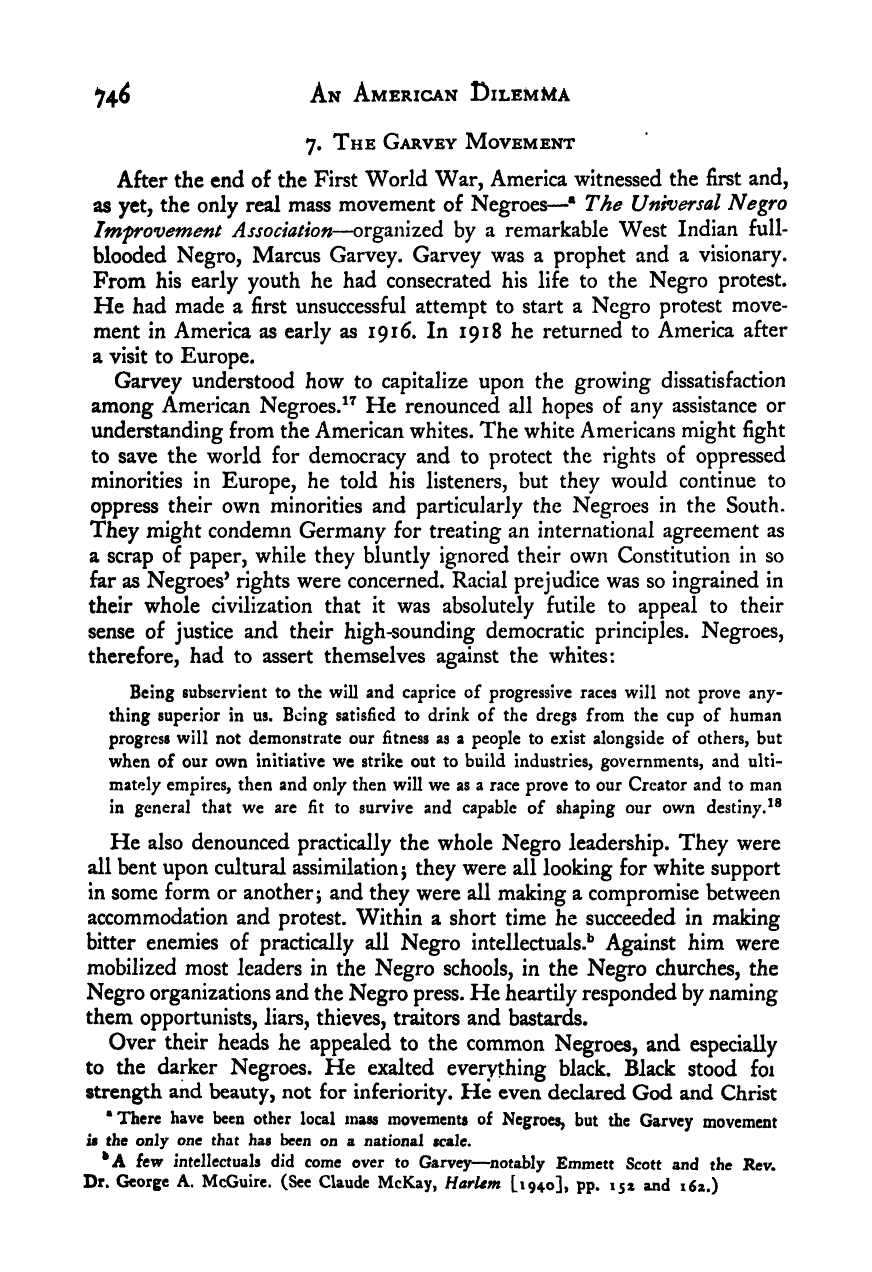Note: Gunnar Myrdal died in 1987, less than 70 years ago. Therefore, this work is protected by copyright, restricting your legal rights to reproduce it. However, you are welcome to view it on screen, as you do now. Read more about copyright.
Full resolution (TIFF) - On this page / på denna sida - IX. Leadership and Concerted Action - 35. The Negro Protest - 7. The Garvey Movement

<< prev. page << föreg. sida << >> nästa sida >> next page >>
Below is the raw OCR text
from the above scanned image.
Do you see an error? Proofread the page now!
Här nedan syns maskintolkade texten från faksimilbilden ovan.
Ser du något fel? Korrekturläs sidan nu!
This page has never been proofread. / Denna sida har aldrig korrekturlästs.
An American Dilemma
7. The Garvey Movement
After the end of the First World War, America witnessed the first and,
as yet, the only real mass movement of Negroes—^ The Universal Negro
Imfrovement Association—organized by a remarkable West Indian full-
blooded Negro, Marcus Garvey. Garvey was a prophet and a visionary.
From his early youth he had consecrated his life to the Negro protest.
He had made a first unsuccessful attempt to start a Negro protest move-
ment in America as early as 1916. In 1918 he returned to America after
a visit to Europe.
Garvey understood how to capitalize upon the growing dissatisfaction
among American Negroes.^"^ He renounced all hopes of any assistance or
understanding from the American whites. The white Americans might fight
to save the world for democracy and to protect the rights of oppressed
minorities in Europe, he told his listeners, but they would continue to
oppress their own minorities and particularly the Negroes in the South.
They might condemn Germany for treating an international agreement as
a scrap of paper, while they bluntly ignored their own Constitution in so
far as Negroes’ rights were concerned. Racial prejudice was so ingrained in
their whole civilization that it was absolutely futile to appeal to their
sense of justice and their high-sounding democratic principles. Negroes,
therefore, had to assert themselves against the whites:
Being subservient to the will and caprice of progressive races will not prove any-
thing superior in us. Being satisfied to drink of the dregs from the cup of human
progress will not demonstrate our fitness as a people to exist alongside of others, but
when of our own initiative we strike out to build industries, governments, and ulti-
mately empires, then and only then will we as a race prove to our Creator and to man
in general that we are fit to survive and capable of shaping our own destiny.^®
He also denounced practically the whole Negro leadership. They were
all bent upon cultural assimilation 5
they were all looking for white support
in some form or another; and they were all making a compromise between
accommodation and protest. Within a short time he succeeded in making
bitter enemies of practically all Negro intellectuals.** Against him were
mobilized most leaders in the Negro schools, in the Negro churches, the
Negro organizations and the Negro press. He heartily responded by naming
them opportunists, liars, thieves, traitors and bastards.
Over their heads he appealed to the common Negroes, and especially
to the darker Negroes. He exalted everything black. Black stood foi
strength and beauty, not for inferiority. He even declared God and Christ
•There have been other local mass movements of Negroes, but the Garvey movement
is the only one that has been on a national scale.
few intellectuals did come over to Garvey—^notably Emmett Scott and the Rev.
Dr. George A. McGuire. (See Claude McKay, Harlem L1940], pp. 152 and 162.)
<< prev. page << föreg. sida << >> nästa sida >> next page >>